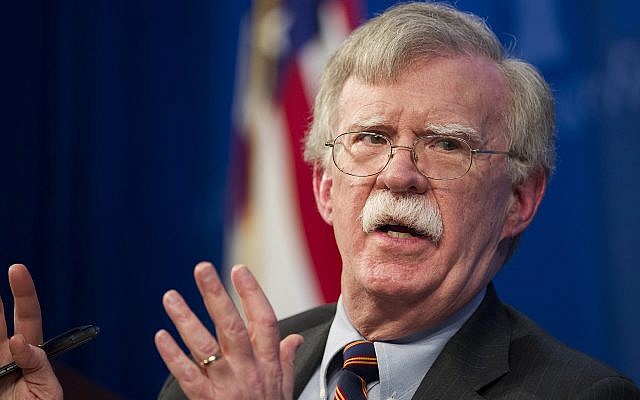Jerusalem: US National Security Adviser John Bolton said Sunday that Iran should not ‘mistake US prudence and discretion for weakness’, after the US abruptly called off military strikes against the Iran in response to the shooting down of an unmanned American surveillance drone.
Bolton’s tough message seemed to be aimed not only at Tehran, but also at reassuring key US allies that the White House remains committed to maintaining pressure on Iran.
Israel, along with Arab countries in the Gulf, considers Iran to be their greatest threat, and Trump’s last-minute about face appears to have raised questions about US willingness to use force against the Islamic Republic.
The downing of the aircraft Thursday marked a new high in the rising tensions between the United States and Iran in the Persian Gulf.
The Trump administration has vowed to combine a ‘maximum pressure’ campaign of economic sanctions with a build-up of American forces in the region, following the US withdrawal from the 2015 nuclear deal between Iran and world powers.
President Donald Trump says he backed away from the planned strikes after learning 150 people would be killed. But Bolton, a long-time Iran hawk, emphasized that the US reserved the right to attack at a later point. He also said a new set of sanctions on Iran are expected to be announced Monday.
“No one has granted them a hunting license in the Middle East. As President Trump said on Friday our military is rebuilt, new and ready to go,” Bolton said in Jerusalem alongside Israeli Prime Minister Benjamin Netanyahu, himself a vocal critic of Iran over the years.
“And as he made clear yesterday, referring to his earlier remarks, the president said, ‘I just stopped the strike from going forward at this time,'” Bolton added.
Bolton is visiting Israel for three-way talks with his Israeli and Russian counterparts that are expected to focus on Iranian involvement in conflicts across the region, including in neighbouring Syria.
Israel’s prime minister has been a vocal critic of Iran over the years, accusing the Islamic Republic of sinister intentions at every opportunity.
But Netanyahu, a long-time critic of the nuclear deal, has remained uncharacteristically quiet throughout the current crisis between the US and Iran. The Israeli leader appears to be wary of being seen as pushing the US into a new Middle Eastern military conflict.
Standing alongside Bolton, Netanyahu sided with the Americans. He said Iranian involvement in conflicts across the region had increased as a result of the nuclear deal, which gave the country a new cash infusion, and had nothing to do with the U.S. exit from the agreement.
“After the deal, but before recent events, Iran has been on a campaign of aggression,” he said.
“Those who describe the recent actions as somehow opening a hornet’s nest are living on another planet.” Netanyahu made no mention of the called-off airstrike and said he was ‘pleased’ by US plans for increased economic pressure. But Israeli commentators said that Trump’s about-face was a cause for concern.
“It further undermined the already limited confidence of other Western leaders in Trump’s judgment, it cast the U.S. president as a paper tiger and provided a moment of triumph for the ayatollahs in Tehran and it raised new doubts about the rationale behind Netanyahu’s drive to persuade Trump to abandon the 2015 nuclear deal,” wrote Haaretz columnist Chemi Shalev.
AP
